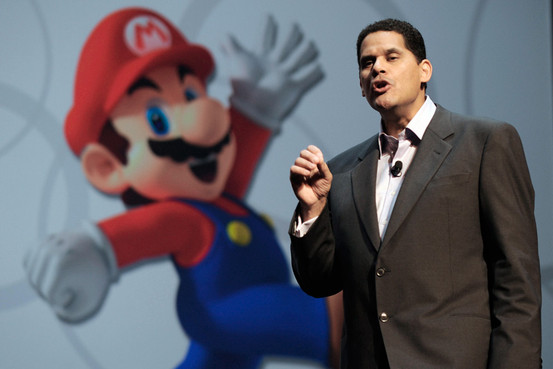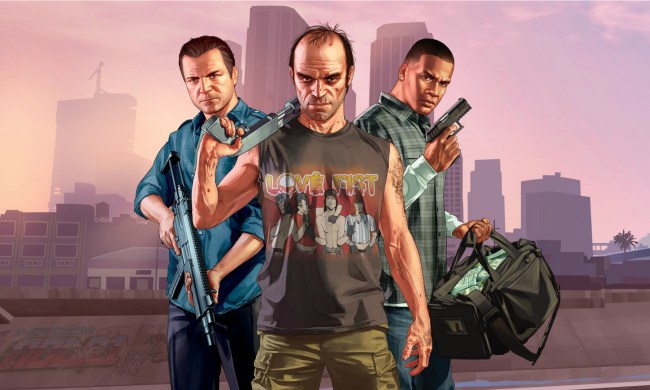Video games are the worlds largest form of entertainment, reaching billions of people every year. Yet the industry is mired in product shortages, delays, and a burgeoning crisis of diversity and inclusion. The industry is in desperate need of leadership to restore order. Enter Reggie.
Reggie Fils-Aimé is one of the most recognizable people in gaming. From the moment he made his public debut on the E3 stage in 2004, declaring his intention to kick ass, take names, and make video games, he’s projected a larger-than-life image that gamers responded to. Since leaving Nintendo in 2019, he’s written the best-selling book Disrupting the Game: From the Bronx to the Top of Nintendo, been a judge for Rogue Jam, a reality show focused on indie games, and joined various boards and leadership positions in education and business. Digital Trends had the chance to sit down with Reggie at PAX West to discuss the state of the video games industry and bestow upon him a new title: The President of Video Games.
I want to ask you a hypothetical question. Let’s say you are elected the President of Video Games, and it is now time for your annual State of the Union address. In your eyes, how is the State of the Industry? What should the priorities be that we focus on?
Well as President of Video Games — and I think I have to take that title and make a business card out of it — but as President of Gaming, first, we need to recognize that video games today are the predominant form of entertainment in the world. In the world, it’s a $200 billion industry, much larger than any other form of entertainment. Three billion people play video games, I mean, just think about that.
It’s a shame that a consumer today that wants a PS5 or an Xbox Series X, can’t just go to a retail store and buy it.
So from that vantage point, it is a big and vibrant industry. But having said that, there are challenges. And to me, the challenges are, how can this industry continue to innovate and bring great new content? You know, I have to say, as a player, some of the content that I’ve been seeing is a bit more of the same. Now, every first-person shooting style game looks the same. Every adventure game looks the same. And I do think this is an industry that likes to follow fads. And I believe we need to challenge ourselves to constantly be creating things that are new things, that are provocative things that the player hasn’t seen before. So that’s the first challenge I would put out.
The second challenge I would put out is that while new systems have been launched recently, they’re still incredibly difficult to buy. I would challenge the makers of the new platforms to address their supply chain issues. It’s a shame that a consumer today that wants a PS5 or an Xbox Series X, can’t just go to a retail store and buy it. And I do think that is limiting the industry. I certainly think that’s, in part, why some developers are delaying their games, because the install base of all of these great new fancy systems isn’t anywhere near where it should be a couple of years into the mission. So there needs to be more of physical hardware out there for consumers to buy and for consumers to then enjoy the latest games on.

And then the third thing I would highlight, as the President of Video Games, is just how this industry needs to do more to have leadership and heads of studios actually look like the people who play games. So we’re doing [this] interview at PAX, as I look around, and see who’s playing games. You see a diverse population, you see people who have unique life experiences. But regrettably, the leadership of this industry kind of all looks the same.
And so that’s how I would summarize the State of the Industry. We’re big, we’re dominant. We are an industry that a lot of people participate in. But we need fresher content. We need systems readily available. And we need company leaders to look like the players.
When you came to Nintendo, you were a Cornell graduate. You had experienced success with multiple organizations of a similar international scale. You checked all the boxes from a resume standpoint. But, unlike most of your peers at that executive level, you were a person of color. You were a first-generation kid from the Bronx, born to immigrant parents, who were caught up in the middle of the coup in Haiti before moving to the United States. How did your background and upbringing influence who you were and how you operate?
I believe that my background helped me be effective. First, I am tenacious, and I don’t take no for an answer. I’m constantly pushing and challenging organizations. And I highlight a number of these stories in my book. But I was constantly pushing and challenging, not only Nintendo of America, in ways that we needed to do better, in ways that we needed to improve our approach, whether that was in how we worked with our retailers, but also in the activities we did internally, how we trained and developed our staff. I was also aggressive with the Nintendo parent company in Kyoto, in terms of pushing ideas that I thought made sense for the company. Now, I was fortunate that Satoru Iwata and Shigeru Miyamoto and other executives supported my ideas, and they appreciated how I was pushing the company. But that tenacity and that grit, I think, were critical at the time. And it’s core to who I am and my upbringing.
Just hiring people from diverse backgrounds at the entry level is not enough.
I think the second thing I would highlight in my own personal development and approach is I’m constantly pushing for different types of ideas. I call it lateral thinking, I’ll take ideas from one industry and apply them to the next. I was fortunate that at Nintendo, the approach of leveraging a variety of different ideas, pushing the company to do things that hadn’t been done before, was appreciated, but it’s part of who I am, it’s core to how I approach business.
So something that you mentioned earlier was the importance of diversity, not just in hiring more staff from various backgrounds, but at the leadership levels. Why is that so important? And why is just hiring your entry-level employees from a larger pool, not sufficient?
Fundamentally, I believe that if I work with people who have vastly different life experiences, who have differences from how I think, how I approach business, that are all based on their own uniqueness — if we get a group of folks who have all of those unique and differentiated experiences — I’m convinced that we can solve any problem; that we can push forward successfully, in any business. And so that fundamental belief and diversity is just core to who I am, and its diversity in its biggest, broadest scope.
In order to get there, you really need to have a very open-minded approach because, as you framed the question, just hiring people from diverse backgrounds at the entry level is not enough. Because if you don’t have the right systems and support, they’re not going to succeed to the highest levels. Or if they do, it takes a really long time. So you have to have that mentality of diversity throughout the company. And for me, it manifested in the people I hired at leadership levels, it manifested in the ways I encouraged all of our staff to progress within the company. And I’m proud to say when I left Nintendo of America, you know, the team that I left behind was exceptionally diverse at the leadership level. And it’s because it’s something that I made a priority.
And so, you know, I think in order for any business or any industry to progress in this area, it has to be a priority, it has to be something that the leadership believes in and has to be something that is addressed at every level. And not just a mentality of “Well, just get more diverse people at the entry level and we’ve done enough.” That’s never enough.
There needs to be continued evolution in digital types of events.
We’re here at PAX West. You’re famous for your participation in many events, including your Nintendo debut. But we just went through a stretch where we had very few, to no events, and now we’re just getting back. People do seem to be responding and excited to be here. But in your mind, in 2022 are live events like this still relevant?
They are absolutely relevant. And I say that because it’s incredibly important for players to get their hands on a controller; to experience a new piece of content. It’s important in their own process, in deciding whether or not they’re going to buy that piece of content when it launches. It’s incredibly important for developers to see average consumers holding a controller and playing a game. Developers learn so much from seeing just how a consumer reacts to their piece of content.
And outside of just Quality Assurance.
Absolutely. Someone outside of QA, because when you’re QA-ing a game, you end up playing that game over and over again. I mean, you’re trying to break the game. That’s different than being handed a controller and trying to play a game for fun and enjoyment. It’s a completely different experience. And developers obviously need both. I experienced this personally, while at Nintendo, to see a developer watching a player experience a game for the very first time, the way they navigate their avatar, it’s incredibly important, and they learn so much. So these events, yes, are critically important.
But they’re also not enough. And I do believe that there needs to be continued evolution in digital types of events. You know, I believe that platform holders need to find ways to make content available digitally, at the same time that they’re holding a digital event. So imagine, I’m going to be that President of Video Games again. Imagine, during Pax and during Gamescom, if platform holders made content available, not just for players at the physical event to play, but for players across the world to have a first hands-on experience. That’d be phenomenal. That would generate so much buzz and excitement for a particular piece of content. And some people have done this to a limited extent, Nintendo is famous for doing a Nintendo Direct and at the end making content available immediately thereafter. But I think there’s an opportunity to do more and more of that so that you’re able to leverage the benefit of a physical environment.
I want to talk to you about your book. Disrupting the Game. A lot of people use a book as a bow to put on the end of a career. But this seems like more of a midpoint. So what compelled you to write the book? And what do you hope people take away from it?
The book is really part of my overall next mission, which is empowering and encouraging the next generation of business leaders and doing it at scale. And when I say doing it at scale, I certainly did it during my time at Nintendo, but what I’m trying to do is to encourage, to empower a vast majority of new leaders, by sharing my lessons, by sharing the benefit of my experience. So I’m doing this through the book, I’m doing this through the speeches that I give, I’m doing it through the board service that I do. It really is my opportunity to touch as many emerging leaders as I can and to give them the benefit of my knowledge and my experience. That’s what I’m trying to do now.
I’m incredibly passionate about it because I do believe that the best way for new leaders to hone their skills is for them to learn, for them to have the benefit of lessons not just from me, but from a variety of different potential teachers. So that’s the point of the book, it is part of that overall approach. The feedback that I’ve had on the book has been phenomenal. The fact that it’s a best-selling book, the fact that it has over 750 five-star reviews at this point in time is pretty phenomenal. But it really is just a piece of this overall passion to help develop the next generation of leaders.
At this point “the game” isn’t Nintendo or video games. The game is the industry itself.
It’s industry at its greatest power. You know, I sit on three public boards, they’re all very different businesses. They’re not in the video game business, these public companies. And so, you know, for me, it really is an ongoing opportunity to help shape the next generation of leadership at scale and across a range of different editions.





